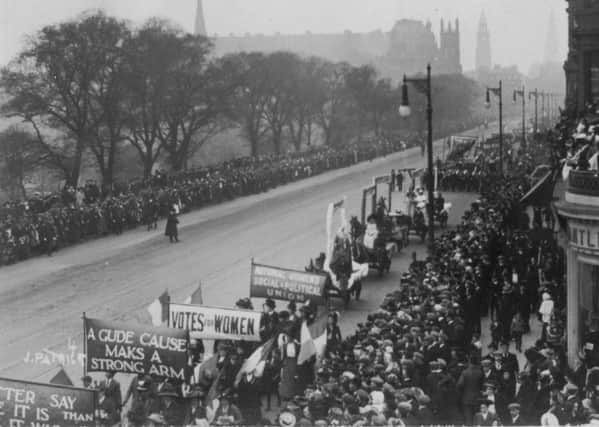Richard Leonard: Hardie's spirit lives on in equality battle


The text in question was “The Citizenship of Women: A Plea For Women’s Suffrage”. Its author, Keir Hardie.
For the founder of the Labour Party, equality was paramount to improving both society and the economy. Yet he was one of just a handful of men in parliament four-square behind the women’s suffrage movement. Hardie believed emphatically, as his pamphlet attested, that “only by removing the disabilities and restraints imposed upon woman; and permitting her to enter freely into competition with man in every sphere of human activity, that her true position and function in the economy of life will ultimately be settled” – and that included being able to vote.
Advertisement
Hide AdAdvertisement
Hide AdAnd while his detractors accused him of focusing on the wrong idea, of trying to prevent universal suffrage for all men, he knew that if women were not given the franchise in their own right, then any further expansion of adult voting rights would continue to exclude them.
While Hardie’s battle for women mostly took place in London, Scotland was, as with all things radically political, at the heart of the suffrage movement – something of which we should all be proud. Edinburgh was home to one of the earliest suffrage societies, and with HH Asquith and Winston Churchill both holding Scottish constituencies there were many opportunities for the suffragettes to take their message directly to those in power. They certainly took them – Churchill reportedly took refuge in a shed in Dundee to escape the strength of their arguments.
Sadly, Hardie died three years before the Suffrage movement’s aim was partially achieved. With the passing of the Representation Act of 1918 property owning women over 30 were given the right to vote – though it would take another ten years before women got equal voting rights with men.
This Tuesday will be the 100th anniversary of that momentous day, and the Scottish Parliament will mark it with a debate celebrating that achievement and how it changed our society.
It would be more than misguided though, to think that there has been nothing but progress since then in the battle for equality and women’s’ rights. There are still too few women in our politics and our parliaments. We may have a female first minister, but only 34.9 per cent, or 45, of our 129 MSPs are women in the Scottish Parliament. In Westminster it’s worse, with just 32 per cent of 650 MPs being women.
Pay inequality is still rife – despite a Labour government introducing the Equal Pay Act in 1970. The recent Me Too campaign has explicitly shown how too many men – especially those in powerful positions – routinely sexually abuse women.
However, there has been progress. Indeed, in the Scottish Parliament in the past week alone we passed legislation to ensure gender parity on the boards of public sector organisations and a new Domestic Abuse Bill to tackle the psychological, physical and emotional abuse of women by their partners.
And in the Labour Party too we keep striving to ensure that women are equally represented. We need women to become parliamentarians where they can effect the real change needed in women’s lives and I am unapologetic in my pursuit of All-Women shortlists when it comes to choosing our candidates. Women have always been, and must continue to be, at the forefront of radical change.
Advertisement
Hide AdAdvertisement
Hide AdFrom Mary Barbour and her rent strikes to Agnes Hardie’s campaign for workers to get paid holidays. From Kezia Dugdale’s launch of Women 50:50 fighting for gender balance in public life, to Monica Lennon’s campaign to end period poverty. From the Dundee suffragettes to the thousands of women who will protest against the visit of Donald Trump should he come to Scotland – Scottish women’s voices should always be heard and respected.
A century has passed since women won the right to vote. We should not let another century go by before women and men are equal in all things.
Richard Leonard is the leader of the Scottish Labour Party